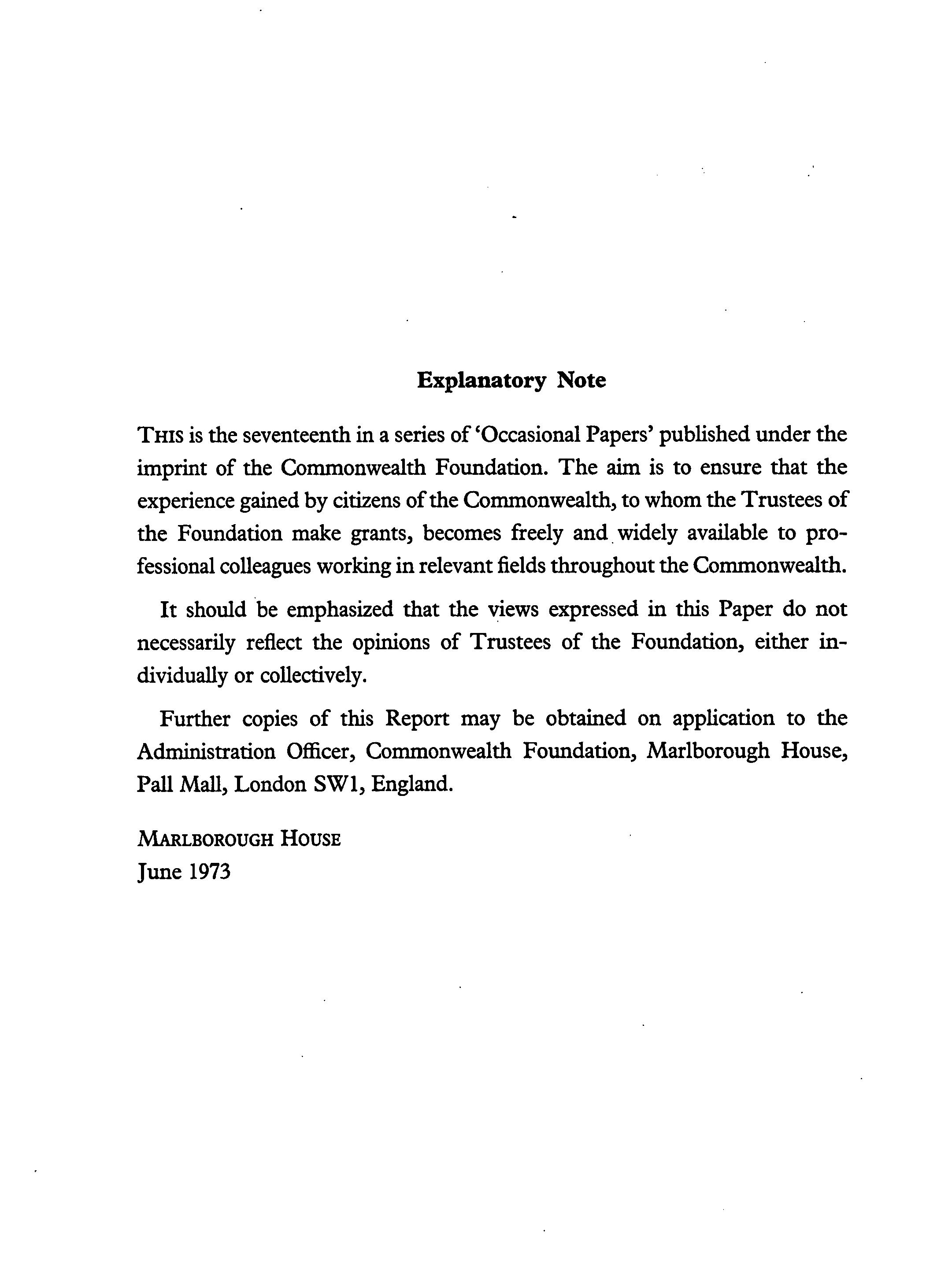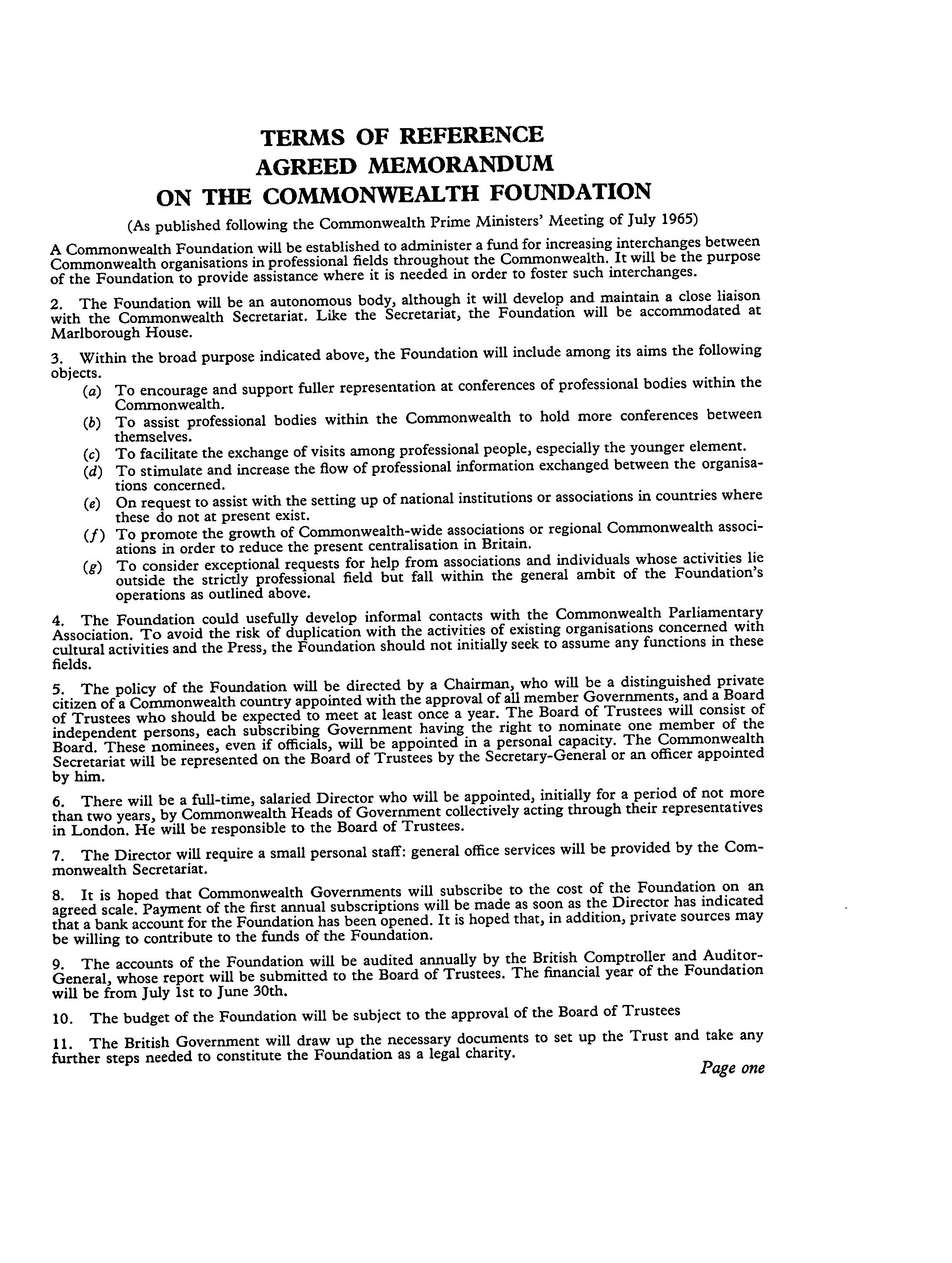
3 minute read
Introductory Note
Explanatory Note
THIS is the seventeenth in a series of 'Occasional Papers' published under the imprint of the Commonwealth Foundation. The aim is to ensure that the experience gained by citizens of the Commonwealth, to whom the Trustees of the Foundation make grants, becomes freely and widely available to professional colleagues working in relevant fields throughout the Commonwealth.
Advertisement
It should be emphasized that the views expressed in this Paper do not necessarily reflect the opinions of Trustees of the Foundation, either individually or collectively.
Further copies of this Report may be obtained on application to the Administration Officer, Commonwealth Foundation, Marlborough House, Pall Mall, London SW1, England.
MARLBOROUGH HOUSE
June 1973
TERMS OF REFERENCE AGREED MEMORANDUM ON THE COMMONWEALTH FOUNDATION
(As published following the Commonwealth Prime Ministers' Meeting of July 1965) A Commonwealth Foundation will be established to administer a fund for increasing interchanges between Commonwealth organisations in professional fields throughout the Commonwealth. It will be the purpose of the Foundation to provide assistance where it is needed in order to foster such interchanges. 2. The Foundation will be an autonomous body, although it will develop and maintain a close liaison with the Commonwealth Secretariat. Like the Secretariat, the Foundation will be accommodated at Marlborough House. 3. Within the broad purpose indicated above, the Foundation will include among its aims the following objects. To encourage and support fuller representation at conferences of professional bodies within the Commonwealth. To assist professional bodies within the Commonwealth to hold more conferences between themselves. To facilitate the exchange of visits among professional people, especially the younger element. To stimulate and increase the flow of professional information exchanged between the organisations concerned. On request to assist with the setting up of national institutions or associations in countries where these do not at present exist. To promote the growth of Commonwealth-wide associations or regional Commonwealth associations in order to reduce the present centralisation in Britain. To consider exceptional requests for help from associations and individuals whose activities lie outside the strictly professional field but fall within the general ambit of the Foundation's operations as outlined above. 4. The Foundation could usefully develop informal contacts with the Commonwealth Parliamentary Association. To avoid the risk of duplication with the activities of existing organisations concerned with cultural activities and the Press, the Foundation should not initially seek to assume any functions in these fields. 5. The policy of the Foundation will be directed by a Chairman, who will be a distinguished private citizen of a Commonwealth country appointed with the approval of all member Governments, and a Board of Trustees who should be expected to meet at least once a year. The Board of Trustees will consist of independent persons, each subscribing Government having the right to nominate one member of the Board. These nominees, even if officials, will be appointed in a personal capacity. The Commonwealth Secretariat will be represented on the Board of Trustees by the Secretary-General or an officer appointed by him. 6. There will be a full-time, salaried Director who will be appointed, initially for a period of not more than two years, by Commonwealth Heads of Government collectively acting through their representatives in London. He will be responsible to the Board of Trustees. 7. The Director will require a small personal staff: general office services will be provided by the Commonwealth Secretariat. 8. It is hoped that Commonwealth Governments will subscribe to the cost of the Foundation on an agreed scale. Payment of the first annual subscriptions will be made as soon as the Director has indicated that a bank account for the Foundation has been opened. It is hoped that, in addition, private sources may be willing to contribute to the funds of the Foundation. 9. The accounts of the Foundation will be audited annually by the British Comptroller and AuditorGeneral, whose report will be submitted to the Board of Trustees. The financial year of the Foundation will be from July 1st to June 30th. 10. The budget of the Foundation will be subject to the approval of the Board of Trustees 11. The British Government will draw up the necessary documents to set up the Trust and take any further steps needed to constitute the Foundation as a legal charity. Page one











